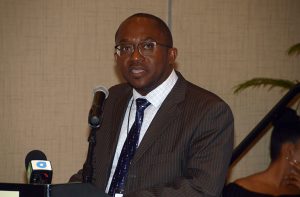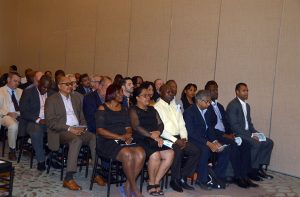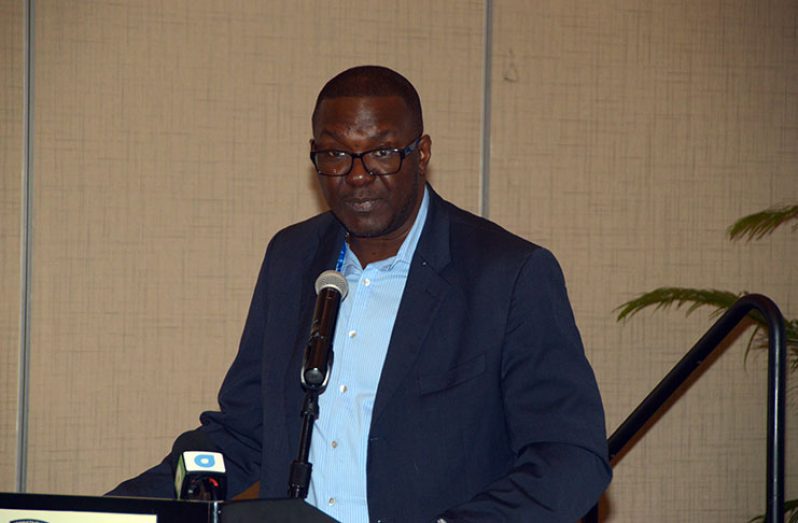By Naomi Marshall
THE Caribbean Port State Control Committee (CPSCC) concluded its 24th annual meeting geared at improving the living and working conditions of seafarers in the Caribbean last week.
The three-day-meeting commenced on Wednesday, with an opening ceremony at the Guyana Marriot Hotel. This is the second time in the 24-year history of the committee that Guyana is hosting the meeting, the first being in 2002.
The meeting was held under the headship of Guyana’s Maritime Administration Department (MARAD). The CPSCC meets annually to collectively discuss standards to abide with the International Maritime Organisation’s (IMO) conventions.
In his feature address at the opening ceremony, Caribbean Memorandum of Understanding (CMOU) Chairman, Michael Amafo, said the maritime industry is vulnerable to the “outgoing tide and flows” of the Global Economic Markets.
He noted that the economic calamity along with the continuous threat of environmental degradation through pollution and weather conditions, show the need for shipping companies, registries and administrations to be creative in order to not only stay profitable, “but to stay afloat”.
As a Region, Amafo posited that the states must work harder and recommit to the goals of the Memorandum of Understanding. However, this can only be achieved by giving effect to the provisions of the memorandum and taking the necessary steps to not only approve the relevant instruments, but to ensure that they are enacted into national legislation.

“We the administrators cannot expect our port state control officers to properly carry out their duties if we do not provide them with the necessary legislative tools to do so,” he stated.
Amafo added that the CMOU must focus on their port state control officers’ ongoing learning, development and training.
“The continued enhancement of regional learning, development and training is a must with the annual CMOU seminars being held according to schedule.
This requires not only the spirit of collaboration between member states and international organisations, but also requires use of the ‘Train and Trainer’ concept to ensure that port state control officers participating in these seminars or any other port state control seminars are adequately equipped to impart their knowledge and training to other port state control officer in their respective countries,” he noted.
SIGNIFICANT
Speaking on behalf of Public Infrastructure Minister, David Patterson, Chief Works Officer, Geoffrey Vaughn, said the meeting is one of significance and is taking place at a time when Guyana is focusing on the development of its oil and gas sector which predictably will change its socio-economic landscape.
“Given the reality that the exploration for petroleum is taking place in Guyana’s Exclusive Economic Zone (EEZ), it is obvious that there would be an intensification of shipping activities in the country’s EEZ as well as in our internal waters. This new development of course poses new challenges relative to shipping and shipping-related activities,” said Vaughn.
He noted that in order for the country to respond to the new demands and challenges, many measures need to be developed. These measures will aid in addressing port state, flag state and coastal state related issues.
He added: “The Government of Guyana has taken a quantum leap in the direction of improving the maritime legislative framework so that the country could be better prepared to develop the oil and gas industry specifically and maritime transport in general with emergence of this industry. The Maritime Administrative Department (MARAD) is mandated to intensify flag state as well as port state inspectors for as a coastal state we are mindful of safety and security and security as well as the protection of the country’s maritime environment.”
Vaughn commended the CPSCC for its ongoing role in promoting the devising of strategies aimed at ridding the Caribbean of substandard ships and noted that it is therefore the resolution of the maritime administration to continue to play an essential role in the activities of the CPSCC.
PRIORITY
“Well developed and effectively functioning maritime administrations throughout the Caribbean must be one of our priority issues, given the fact that we face such threats as global warming, international terrorism, the impacts of globalisation and natural disasters, that is, floods and hurricanes,” he said.

Vaughn pleaded with the directors and leaders of port state in the Caribbean Region to use the days allocated for the meeting to engage in meaningful consultations, deliberations and interactions aimed at the improvement of the port state regimes of the maritime administrations of the Region.
“Focus on the improvement of human capital, an area in which there continues to be a noticeable deficit as well as the adoption strategies aimed at making your respective administrations more responsive to the standards set by the IMO,” he said.
Also at the event was the Regional Maritime Safety Adviser, Colin Young; Director General of the Maritime Administration Department, Claudette Rogers; representatives of the Shipping Association; members of the diplomatic corps and representatives of the CPSCC member states.
CPSCC consist of 18 member states, namely Guyana, Antigua and Barbuda, Barbados, Dominica, Grenada, Jamaica, the Netherland Antilles, Suriname, Trinidad and Tobago, Aruba, Bahamas, Belize, Bermuda, Cayman Islands, Cuba, France, St. Kitts & Nevis, and St. Lucia. In addition, St. Vincent and the Grenadines has joined as associate member state.



.jpg)








